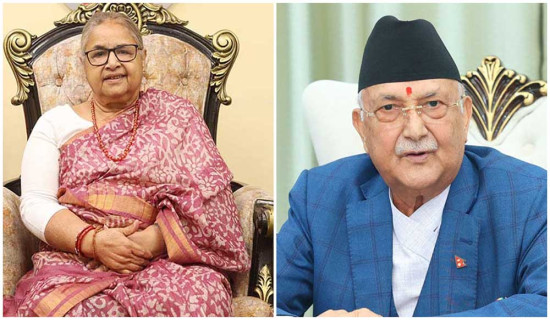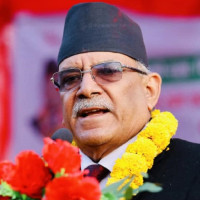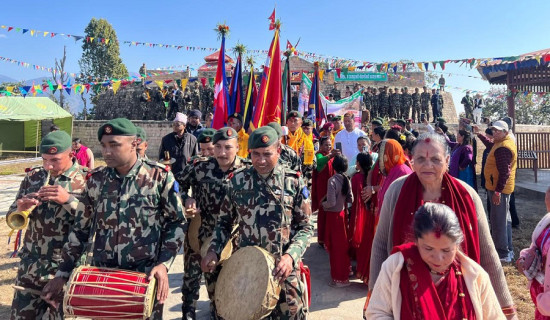- Thursday, 8 January 2026
Our past projects are getting continuity
Chichila Rural Municipality is the smallest local level in terms of geography and population in Sankhuwasabha district. It was formed by amalgamating the erstwhile Diding and Matsya Pokhari village development committees. It has five wards. It is connected to Khandbari Municipality where the district headquarters is. The Koshi Highway runs through its central part. The chairman of the rural municipality, Pasang Nurbu Sherpa, is serving his second term. Our correspondent Dhyan Kulung recently talked to Sherpa focusing on his immediate development plans. Excerpt:
The second fiscal year of your second term has ended. Have you been able to work as you wished?
I learned a lot during my first term. The people allowed me to serve again with a significant majority, for which I am grateful to all the people of this rural municipality. Using the experience, knowledge and skills gained from managing local government operations, we are working in productive and impactful areas. We have continued the large projects initiated during the previous term and have also launched result-oriented programmes. Almost all important areas are connected to the road network. We have started blacktopping the main roads. Additionally, our focus is on projects that will yield long-term benefits.
What programmes are you implementing to yield long-term benefits?
We have introduced a large-scale integrated agricultural programme since the previous fiscal year. Under the programme, we planted coffee, oranges, lemons and avocado seedlings. In the past, we provided jobs for at least 100 days to the unemployed through the Prime Minister’s Employment Programme. However, it was not a long-term solution. Therefore, we started a large-scale agricultural programme involving those registered as unemployed in a tripartite partnership between the farmers, the rural municipality and the Prime Minister's Employment Programme with cost-sharing among the three parties. This year, we planted more than 30,000 seedlings in over 800 ropanis of land involving the unemployed. We expect this programme to improve farmers’ income levels.
You had mentioned in the past that a master tourism plan was being developed. Has the construction work been completed?
How could it be completed? The necessary funds from higher authorities have not arrived. Despite our frequent visits to the Ministry and the Planning Commission, we managed to secure only a small budget, which is not enough to complete the work. Funding for the extensive Matsya Pokhari tourism area, located in the former Matsya Pokhari VDC, has completely stopped. After repeated attempts, we finally received Rs. 5 million for the Makalu Hirak Park. However, to complete this project, an additional Rs. 29.195 million is still needed out of the total estimated cost of Rs. 50 million.
Likewise, we only received a supplementary grant of Rs. 6.5 million from the provincial government this year. The work on the Balutham Hill trail, which connects the Park, has also been halted halfway. We have not been able to carry out the desired work in tourism sector in a lack of insufficient budget.
What is the status of road connectivity in the municipality?
The work of opening tracks for our internal roads is almost complete. We are now preparing to blacktop them. We have planned to blacktop the road connecting Chichila Bazaar Zero Point to Ward No. 5 via Matsya Pokhari in Ward No. 4. The work is likely to start this winter.
Is the rural municipality introducing 11 and 12 classes from this academic session? Is this possible in a small municipality like Chichila?
We will know about it in the future. Currently, there are four secondary schools within the rural municipality. Among them, the oldest is Saraswati Secondary School in Ward No. 4 with the highest number of students. Thus, we are preparing to start 11 and 12 classes there. The rural municipality has made a significant investment in education both in developing physical infrastructure and preparing human resources. This is why we promised to add grades 11 and 12 in our manifesto.
In this school alone, 10 students passed the regular SEE exam this year and 37 students are preparing to take the supplementary exam. Meanwhile, those students who passed SEE last year and could not go to other cities for further education are still here. Therefore, it is essential to run 11 and 12 classes here.
Do you have any final words?
Many of the local representatives have been re-elected. We are all young and are motivated to do something meaningful. Our rural municipality was ranked first in the district for last year’s performance evaluation and we were second in the district for the least arrears thanks to the collective efforts of everyone.
Another important point is that prosperity is not possible without an integrated system. This is why we have implemented an integrated agricultural programme and shortly we will focus on creating integrated settlements as well.






-original-thumb.jpg)









